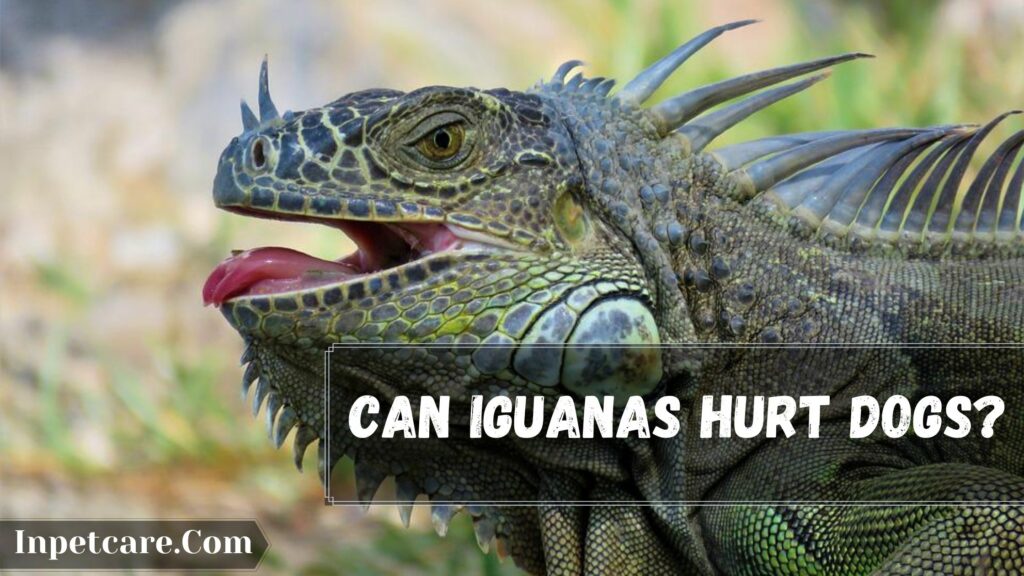If you are thinking of introducing your dog to an Iguana, you might wonder if any of them can get hurt. In this article, I will not only answer the question: can iguanas hurt dogs? But also what problems a dog can have if they lick or eat an Iguana. We’ll also look at some tips that help introduce both pets in a safe environment & manner.
Can Iguanas Hurt Dogs?

Using its flapping tail and sharp claws, Iguana can cause a lot of damage to your dog and around your house. When iguanas are out of their enclosure, they become hyperactive. Believe it or not, a whip from an adult Iguana can seriously injure your dog’s bones and cause them to fracture.
It is always recommended to keep your dogs away from Iguanas when they’re out of their tank. You should also never allow your dog to roam around the room where the Iguana is exploring, or its tank is kept. An Iguana may feel threatened or stressed in the presence of another animal around their enclosure.
The prolonged stress caused by an overactive dog or curious cat can seriously cause sickness and even death for your Iguana. However, A Whip from its strong tail can even fracture your dog’s bone if they become hyperactive and aggressive. Therefore let’s talk about whether can Iguana be around dogs?
Can Iguanas Be Around Dogs?
Iguana should never be kept around dogs as Iguana are known for their erratic temperament. They are highly territorial and can become aggressive while attacking the dog. The dog-pestering nature is alone enough to irritate or annoy your Iguana.
Iguanas are compassionate creatures, and their erratic temperament can also prompt the dog to become protected in its territory. Therefore the dog may harm the Iguana. As iguanas are herbivorous, their bite is almost harmless.
An Iguana might attempt to bite the dog to keep it away from its enclosure or territory, but it won’t cause any infection. Herbivore bites cause little to no infection when compared with carnivore bites if treated properly. If an Iguana bites your dog, the first thing is to clean it properly to eliminate salmonella.
It is always essential to clean your dog’s wound, even if the bite doesn’t seem to cause any infection. Iguana’s mouth carries some nasty bacteria, so always clean it properly. As Iguana teeth are evolved for grabbing rather than chewing, their bite won’t break a dog’s skin.
Hence, both are highly territorial and need their own space. But, Do you know that iguanas are more territorial and protective of their place than dogs? That is why it is always best to allocate a different room or dog-free space for your Iguana to roam & explore around.
Can Dogs Get Sick From Licking Iguana?
Yes. Dogs can get sick from licking Iguana within a couple of days due to the salmonella bacteria present in Iguana skin. The salmonella bacteria also contaminate Iguana burrows, enclosures, & environment. If your dog accidentally licks or even eats an iguana outdoors, he is likely to be ingesting these bacteria.
Salmon bacteria is alone enough to make your dog sick once it is in its system. Within 3 to 4 days, your dog is likely to begin exhibiting signs of poisoning. Depending upon the age and breed, the average time for a dog to exhibit signs of poisoning will vary.
Also, depending on the type of toxin ingested by your dog, sickness will vary. Here are a few signs of poisoning in dogs to look out for.
- Yellow/ Pale gums
- Seizures
- Vomiting
- Muscle tremors
- Excessive ruling
- Forming at the mouth
- Excessive thirst
- Loss of appetite
- Erratic movements
Is Iguana Poop Poisonous To Dogs?
Iguana poop is not poisonous to dogs, contrary to popular belief. However, some reptiles carry salmonella bacteria, and some dogs with weak immunity may get the bacterial infection, but it is rare. It would help if you always taught your dog never to hunt or kill any reptile, snake, toad, or lizard. Iguana poops may cause some bacterial infections if your dog overeats.
What Happens If A Dog Eats An Iguana?
The most severe problem that a dog will have after ingesting an Iguana is pneumonia when paralysis affects the esophagus. The paralysis may set in within a few hours of ingesting such a lizard, and the symptoms can last a week. If your dog seems to have difficulty eating while can’t stand or walk, visit the veterinarian as soon as possible.
In such paralysis, dogs don’t usually feel pain. Many instances have occurred when a dead iguana lying on the ground after falling from a tree is played or eaten by dogs. The results have always been fatal for most breeds.
The Iguana’s crusty skin is alone enough to cause botulism poisoning. Dead iguanas are the carrier of the bacteria that leads to botulism poisoning. Once a dog ingests such an Iguana, the symptom can manifest within a day.
The paralysis is likely to start from the back legs and tail and then move to the front legs. Unfortunately, this will also disable your dog’s esophagus and diaphragm. If this happens, your dog will not be able to breathe. Sooner, your dog will die due to a sudden communication stop between the nerves and muscles.
It will be painless, but your dog will no longer stand or walk. If your dog is incapable of breathing independently, you will have to get them to the nearest vet clinic and get it intubated to be kept alive. This kind of treatment can be costly. If you can’t afford the treatment, it’s better to euthanize your dog rather than see or let him suffer.
Apart from botulism, Iguana also carries other bacteria like salmonella that can emit poison and affect your dog. Additionally, an Iguana can have flux and worms in its internal organs that can be transmitted to your dog once ingested. So, overall, ingestion of Iguana is poisonous to dogs.
What To Do If Your Dog Eats An Iguana?

If your dog has eaten an Iguana from outside, various toxins can affect it. How severe their health condition or symptoms can get should always be administered and checked by a veterinarian. Once the first symptom manifests, call your pet’s veterinarian.
Professionals will be able to help you learn what could happen and if you need to get your dog checked or not. The most common sickness due to toxins is known as botulism. Botulism can easily be treated by providing supportive care, including intravenous fluid to keep them hydrated, respiratory therapy, and nursing care.
If your dog is exhibiting seizures or tremors, your veterinarian is likely to recommend some medications. Most affected dogs suffering from this toxin recover within 2-3 weeks if they get appropriate medication and supportive care.
Without treatment, your dog can suffer from paralysis of the diaphragm or any other secondary infection resulting in sudden death. If your dog is suffering from salmonella infection, prompt treatment, fluids, and supportive care will be needed. Treatment of salmonella infection in dogs needs antibiotics and even hospitalization for severe cases. Your veterinarian is likely to be the best source of advice if your dog has eaten Iguana from the outdoors.
5 Key Steps To Safely Introduce Your Dog To An iguana
We all know that dogs are human best friends who love being by our side every second. Dogs are the ones that love us for who we are and always put their faith and trust in us. However, being a responsible owner, should you keep a dog and Iguana in the same room?
If you are planning to introduce your dog to an Iguana, then there are some practical steps that you can take to promote a lasting friendship while keeping both of them safe. Here are a few tips and the steps that need to be followed when getting them along or introducing them to each other.
Start In A Quieter & Unfamiliar Area Of Your Home
If you want to introduce your dog to an Iguana, it can be good to do it away from your home. It is best to always start in a quiet area and unfamiliar place of your home where both pets can be in neutral territory. Putting an Iguana in the new territory may be difficult and cause them stress.
But introducing them in a neutral area of the house is always a better idea. It would help if you first began with letting your dog roam around the room where the Iguana enclosure is kept so that your reptile gets used to the dog’s presence.
Once your Iguana seems comfortable after a couple of days, get them to a quiet and unfamiliar area of your home for further introduction. Your study room or guest room can be a great place to start with. But always remember to avoid the areas where your dog spends most of the time. Otherwise, protective behavior for their territory will kick in.
Get Someone To Help
Both the pets are known for being hyperactive. That is why it is always best to start the introduction with two people. Therefore always get someone to help you control your dog and Iguana during the first interaction. It is recommended to always rely on one of your family members to control your dog, and it would help if you continually keep your dog on a leash in the first place.
In most cases, dogs react negatively when they see a new pet. Therefore, keeping them on a leash is a must so that your dog won’t hurt your iguanas. Keep the least loose enough to allow your dog to move around without feeling restricted.
During the introduction session, any restriction can make your dog experience stress. On the other hand, you should always use a flat palm to hold your Iguana and make them feel safe while the dog is on the leash and moving around.
Avoid Overstimulation
Don’t keep the introduction session too long to avoid overstimulation. Adding to this, any unfamiliar person, sudden movement, or loud noises can create stress for both of your pets during the first meeting. It would help if you first focused on getting them comfortable with each other.
Becoming comfortable with each other will be exciting for both Iguana and Dogs. You were so ignoring any additional stimulation. Over-Stimulation will always result in arousing fearful or aggressive behavior. There are not too many people or other animals present in the area where they are meeting.
Adding to this, you should avoid inviting any visitor while interacting with your dog and Iguana. If you have kids, make sure to keep them quiet or have them in a different room. If you want your kids to play with your animals together, always supervise first.
Don’t Leave Either Of Them Unattended.
It would help if you never left your pets unattended. Leaving them left alone together is a lot of risks because your Iguana is likely to feel vulnerable. As the dog tends to be usually a lot bigger than any lizard, any rough play can hurt your Iguana during the first three or four sessions.
The first couple of interactions should always be performed in a well-controlled manner and environment under supervision. Adding to this, both the pets should be closely monitored when they are sharing the same environment.
Once you notice them interacting positively many times, you can allow them to be alone together for a short period to see how they do. Avoid going too far, and if any of your pets do any unexpected negative behavior or action, you must respond very quickly.
Interesting Further Reading
- How Long Can An Iguana Live Without Heat?
- Do Iguanas Need Uvb: How Much Uvb Do Iguanas Need?
- How Long Does It Take For An Iguana To Grow?
Look For Body Language
It would help if you always looked for signs of hostility or stress in both of your pets. Below are some signs that your pets will exhibit if they become stressed or hostile.
Signs Of Stressed Or Hostile Dogs
- Lifted lip
- Stiff posture
- Unwavering stares
- Growling
- Blocking the Other pet from getting close to you.
- Stiff muscle
- Long Stares
Signs Of Stressed Or Hostile Dogs
- Opening their mouth
- Breathing heavily
- Trying to escape
- Thrashing its tail
- Dominating position
- Shutting its eye
- Dewlap
Conclusion
You know that iguanas and Dogs should never be kept together in the same room. They should never be left unattended if the dog is out on a leash and the Iguana is out of the enclosure. Both the pets are capable of injuring each other.
I have tried my best to give you all the ideas: can iguanas hurt dogs? If you find this article helpful, then share it with others to make them aware of the consequences of keeping Iguana and Dogs together.

94% of pet owners say their animal pal makes them smile more than once a day. In 2007, I realized that I was made for saving Animals. My father is a Vet, and I think every pet deserves one. I started this blog, “InPetCare”, in 2019 with my father to enlighten a wider audience.

